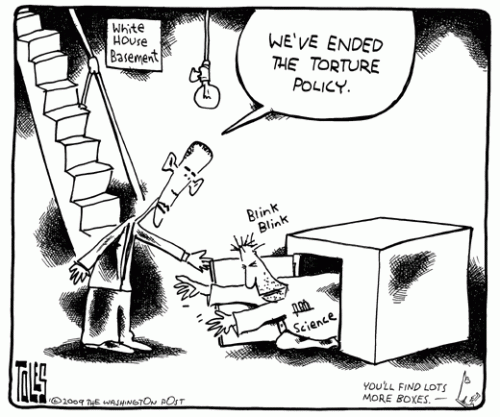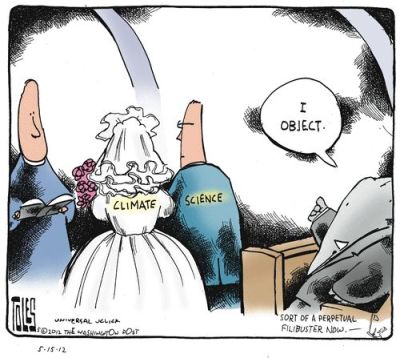After eight years of an anti-science Bush administration, science got a bit of a boost with the election of Barack Obama. Political cartoonist Tom Toles from The Washington Post commemorated the event with this spot-on comic:

However, Republicans continued to push their anti-science ways, working to thwart the Obama administration’s efforts to combat climate change at every turn. Again, Tom Toles was there to highlight this archaic, antiquated thinking in this 2012 comic:

And again in 2014:

Now that the leadership President Obama is just a fond “tear in your eye” memory, we’re all forced to watch as the Trump administration rolls back every Obama-era environmental rule they can. The ascension of Scott Pruitt, the man who sued the EPA 14 times during his tenure as Oklahoma Attorney General, was confirmation that dark times were in store for science in America.
Late last year, Pruitt moved forward with new rule that prevents any person who works for a college or university and who receives grant funding from the EPA from serving on three important federal science advisory boards:
- Scientific Advisory Board, a panel of approximately 45 scientists, examines key scientific issues related to EPA regulations, and produces reports telling EPA what the current state of the science is.
- The Board of Scientific Counselors, with an executive committee of about 20 people, works more intimately with agency scientists, advising the agency’s Office of Research and Development on its research programs.
- The Clean Air Scientific Advisory Committee which provides technical guidance specifically related to air pollution standards, such as questions about the potential health effects of different pollution levels.
[Descriptions courtesy of ScienceMag.org]
Here is what I wrote about this at the time:
The presumption here is that these scientists are somehow personally and financially benefiting from the grant funding. The reality, of course, is that the funding pays for salaries, supplies, equipment, and other expenses needed to do science, not to fatten the wallets of the scientists themselves.
What this directive does NOT do is prevent industry scientists from continuing to serve on the advisory commissions, scientists who work for corporations that DO stand to directly benefit if the EPA loosens protections allowing them to pollute more or avoid other protections that reduce their corporate profits. It’s not a far stretch to imagine corporate scientific advisers being highly incentivized to advise in ways that help their employers.
This isn’t the fox guarding the hen house. This is the fox moving the chickens into the fox’s den.
This week, we’re about to get another taste of what happens when you put shameless corporate grifters in charge. Scott Pruitt is about to issue a rule that does away with the EPA’s use of significant and important science when setting policy and creating regulations:
Environmental Protection Agency Administrator Scott Pruitt is expected to propose a rule Tuesday that would establish new standards for what science could be used in writing agency regulations, according to individuals briefed on the plan. It is a sweeping change long sought by conservatives.
The rule, which Pruitt has described in interviews with select media over the past month, would only allow EPA to consider studies for which the underlying data are made available publicly. Advocates describe this approach as an advance for transparency, but critics say it would effectively block the agency from relying on long-standing, landmark studies linking air pollution and pesticide exposure to harmful health effects.
This move encompasses efforts set forth in two pieces of legislation introduced by conservative Republicans in previous years: the HONEST Act (it’s not “honest”) and the Secret Science Reform Act.
In the end, what these new rules would accomplish is to force the EPA to ignore important and significant scientific studies if any of the data is held in confidence. Why shouldn’t we want all science to be publicly available for all to scrutinize? Here’s what Gretchen Goldman of the Union of Concerned Scientists wrote about this effort back in 2015:
Agencies such as the EPA don’t make all this information publicly available for a number of very good reasons. Protecting individuals’ privacy is prime among them. For example, we’re all aware of the laws that protect the privacy of our medical records. The Secret Science bill appears to require the EPA to release such confidential personal health information about the participants in scientific studies if it wants to use health studies to make regulatory decisions—a direct violation of health privacy law. The bill also fails to protect intellectual property rights, another reason data often cannot be publicly released.
Further, the bill would not compel companies and others to make their relevant data publicly available to the agency.
The upshot is, if this bill became law, the EPA would not be able to use public health data protected by confidentiality agreements to enact science-based regulations. The result? The EPA would not be able to carry out its mission of protecting public health and the environment.
Nearly 1,000 scientists have signed a letter all but begging Pruitt not to move forward with the new rules. Unfortunately, it’s likely to have exactly zero impact.
All of this is happening at a time when President Trump is proposing slashing the EPA’s budget by 23% and the Office of Science and Technology’s budget by over 35%.
It’s clear that science is once again being relegated to the basement prison cells Tom Toles depicted in his 2009 comic. Trump and his crew of crony capitalists are modern-day Nero’s fiddling (and enriching themselves) while the world slowly burns.
The ruling is likely to have a 30-day comment period. I will update this post when information on that becomes available.
[CC image by takver | Flickr]Pruit



